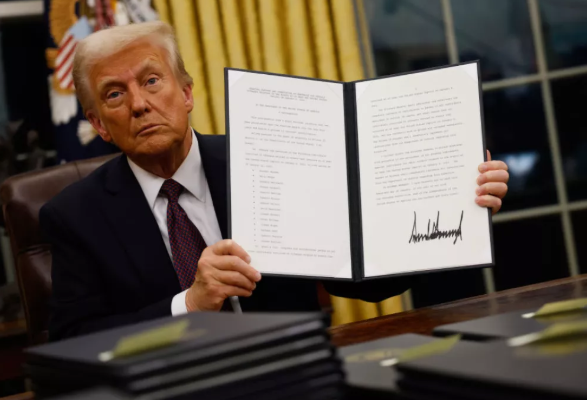A new global trade war has begun.

President Trump is imposing 25% tariffs on most imports from Mexico and Canada, as well as 10% tariffs on imports from China. Mexico supplies more than a quarter of the fresh fruits and vegetables in the U.S., including avocados popular in Super Bowl guacamole.
On Saturday, President Trump signed executive orders imposing a 25% tariff on most imports from two of the U.S.’s largest trading partners, Canada and Mexico. Goods from China will face a 10% tariff.
These tariffs will take effect on Tuesday.
In a social media post, Trump explained that the move is aimed at tackling the illegal flow of drugs and immigrants at the U.S. northern and southern borders.
Canadian crude oil will be subject to a lower, 10% tariff, which could help lessen the impact on gasoline prices in the U.S. as many Midwestern refineries rely on Canadian oil.
The import taxes could lead to price increases on a variety of goods, such as fruits and vegetables, flat-screen TVs, and auto parts. The countries affected are likely to impose their own retaliatory tariffs on U.S. exports in response.
Business groups quickly began responding after the announcement. A trade group representing the liquor industry warned that the tariffs would harm jobs.
“Since the 1990s, trade in spirits across North America has largely been tariff-free, leading to substantial growth. U.S.-Canada trade in spirits has risen by 147%, while U.S.-Mexico trade jumped by 4,080%,” said a joint statement from the Distilled Spirits Council of the U.S., the Chamber of the Tequila Industry, and Spirits Canada.
The group pointed out that these products are unique to each country and that the tariffs would negatively impact domestic industries. Bourbon and Tennessee Whiskey are exclusively made in the U.S., Tequila in Mexico, and Canadian Whisky in Canada.
On Sunday, China’s foreign and commerce ministries issued coordinated statements condemning the tariffs. Beijing said it would take unspecified “countermeasures” in response. The commerce ministry called the tariffs a serious violation of World Trade Organization rules and announced plans to challenge them at the WTO. Meanwhile, the foreign ministry noted that China had already taken steps to help the U.S. address fentanyl, a problem it described as ultimately one for the U.S. to solve, and warned that the tariffs would harm future cooperation on anti-drug efforts.
Businesses and consumers in the U.S. had already begun making contingency plans. Trade data released earlier this week revealed a significant spike in imports in December, indicating that some companies were stockpiling goods ahead of the tariffs.
Individual shoppers also tried to get ahead of the tariffs. Personal spending on durable goods, like cars and televisions, surged in December, according to figures from the Commerce Department released Friday. Mexico is a major producer of flat-screen TVs.
Tariffs have been mentioned over 200 times in corporate earnings calls this month.
The auto industry is expected to feel a significant impact due to its deep integration, with manufacturing spread across all three countries.
General Motors informed financial analysts on Tuesday that it might move some pickup truck production out of Mexico and Canada if tariffs are implemented. However, the company is hesitant to make any changes while the trade situation remains uncertain.
“We are prepared to manage near-term impacts,” said CEO Mary Barra. “But we won’t invest large amounts of capital without more clarity.”


